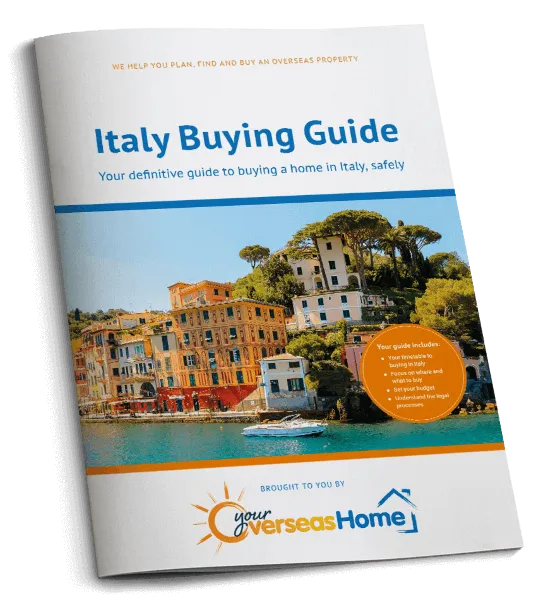Buying a property in Italy has different processes to the UK or USA, but they are nothing to worry about – they are there to protect you. Read about the role of the notary in your Italian house purchase.
Many people are confused whether they need a lawyer or a Notary when buying a property in Italy, or even both. By law, property transfer contracts must be signed in front of a notary. However, the role of the Notary goes much further than simply stamping and signing a document as the witness to a transaction.
As public officers appointed by the Italian Ministry of Justice, they act as a third party independent of both seller and buyer. They ensure that the conveyance of the property complies with all legal requirements, in the common interests of both the buyer and seller, but particularly the purchaser.
Search for homes for sale in Italy
Notary checks
Before the deed can be signed and the property exchanged there are a number of investigations to be carried out. A good estate agent may have already checked some of the following before allowing the property to go on his books, as they don’t want any unexpected problems to crop up with the sale either. It is in their interest to guide you through the whole buying process from getting your Italian tax code (codice fiscale) to communicating with the Notary. If everything is in order it is possible for a straight forward purchase to go through in six weeks.
The notary will check that:
- the seller really owns the property.
- there are no mortgages or foreclosures recorded at the territorial offices of the taxation authorities.
- there are no constraints, such as right of first refusal, or covenants regarding assets classified as historic, artistic or of archaeological value.
- The previous owner has paid all service charges.
- The cadastral plan conforms to the actual state of the property.
- The property is in order regarding building/planning permissions.
- The correct taxes are applied to the purchase. The notary is trained in tax matters and can suggest solutions resulting in tax savings, such as the benefits of purchasing a main residence. It is part of the Notaries job to collect from you the funds to pay the taxes and duties. Upon registration of the deed these will be paid over to the taxation authorities.
- the rules specifically designed to protect those who buy a property under construction have been complied with.
- the energy performance of buildings is certified in accordance with national and regional rules. The seller is required by law to deliver to the prospective buyer a copy of the applicable Italian energy performance certificate (Attestato di Prestazione Energetica or APE for short).
- all regulations have been observed regarding money laundering, traceability of payments and the commissions paid to any real estate agency.

Final checks: At the notary’s office
Choosing a notary
The National council of Notaries (Consiglio Nazionale del Notariato) recommends that a house buyer contact a notary at the start of the negotiations before signing a proposal to purchase or preliminary contract. In this way, every part of the transaction can be considered together with the notary. As it is the purchaser who pays the Notary fees, you are free to select the notary.
In reality, foreign buyers often use the notary recommended by their estate agent,
The choice should not be imposed on you by the estate agent, mortgage provider or seller. Although, in reality, foreign buyers often use the notary recommended by their estate agent, as they will have dealt with them many times before. You can search for a notary in the area of the property using this tool on the Consiglio Nazionale del Notariato website.
The Preliminary Contract
The “Contratto preliminare” is commonly known as a “compromesso”. It is the first contract that the seller and the buyer both sign. Sometimes, the compromesso is preceded by a purchase proposal (“proposta d’acquisto”) which might be a pre-printed form provided by the estate agent, that declares that you want to buy the property at a certain price. But as it is only signed by you it doesn’t commit the seller to sell to you, and they are still free to consider other offers.
It can be hard to know who to trust when buying a home in Italy. We believe you need three experts to ensure a safe purchase. Let us Introduce you to them.
With the compromesso, the agreement is made to sell to you. The total price of the property is set, as well as the terms of payment and the timing of the sale. The deposit is then paid to the vendor. If after payment of the deposit the buyer decides not to buy the property, the seller may retain the deposit; but if the seller decides not to sell, the buyer is entitled to receive back an amount equal to double the deposit paid. If the preliminary contract is made with a notarial deed, the contract can be “transcribed” into the registries: in this way the buyer is protected from any problem that may arise during the time between compromesso and completion of the deed.
The day the Deed is signed
The notary must explain the entire contents of the contract to all present making sure that you understand the contents and legal effects. If you aren’t fluent in Italian, a translator must assist in translating the entire document and also read it through with you alongside the notary. Once read, the three copies of the contract must be signed by everyone in front of the notary, and then signed by the notary.
The process can take quite a while, and it’s possible to have special power of attorney if you wish.
The buyer is then asked to pay the seller.
Paying through the Notary
The payment to the seller is often done by either an Italian bankers draft or a bank transfer. The safest way to transfer the money is through a Notary’s escrow account, which is a bonded client account (registered by Italian Law 124/2017) in which the notary can receive funds for the payment of property and hold it safely in that account until it’s time to make the payment to the seller. In Italy only a Notary escrow account benefits from full and complete protection against possible creditors on funds held in it.
The main notary fees vary depending on the value of the property, usually about 1%
The notary will hold funds until the deed of the sale has been filed/registered, thus providing protection to the buyer in the period between signing the deed of sale and its registration. The Notary may ask an additional charge for this service, typically about €200. The main notary fees vary depending on the value of the property, usually about 1%. The percentage may be higher on a low-priced property.

The process may seem complicated, but it’s worth it!
After signing
The notary must then carry out the registration of the deed with the taxation authorities and pay the relevant taxes on your behalf. The deed must be filed in the public register. This is required by law so that everyone can see who owns the property and if it is subject to mortgages or encumbrances. The land registry is also updated with the cadastral registration.
Do I also need a lawyer?
It is not a legal requirement to hire a lawyer when buying a property in Italy. Most Italians conduct a house purchase using only an estate agent and a notary. When the agent and notary don’t speak the buyers language, some foreigners decide to also hire an Italian English speaking lawyer (avvocato). They’ll be able to talk you through the buying process and act solely in your interest to identify any problems at an early stage. Preferably they should work in the same province as the location of the property and the notary, as their local knowledge can be very beneficial.
At Italy Property Guides we always recommend engaging a specialist property lawyer in Italy. We can introduce you to a trusted, affordable, English-speaking lawyer in Italy.
If you suspect there could be any problems in the pre-purchase checks, such as boundary disputes, outstanding debts, no planning permission, or that the property is owned by a number of relatives, getting a lawyer to do checks at an early stage may give you some reassurance. It’s possible that any problems can be resolved, before you part with any money. If you are unable to attend the final completion at the notaries office, you may also draft a special power of attorney allowing the lawyer to represent you in front of the notary.
Most importantly, you must ensure that all the professionals you hire in Italy thoroughly explain the buying process to you. Don’t be afraid to ask a lot of questions. For example, ask the real estate agent to see a current title record showing that the seller does own the property. You are paying the notary, estate agent and lawyer to ensure the purchase goes through smoothly and legally.











